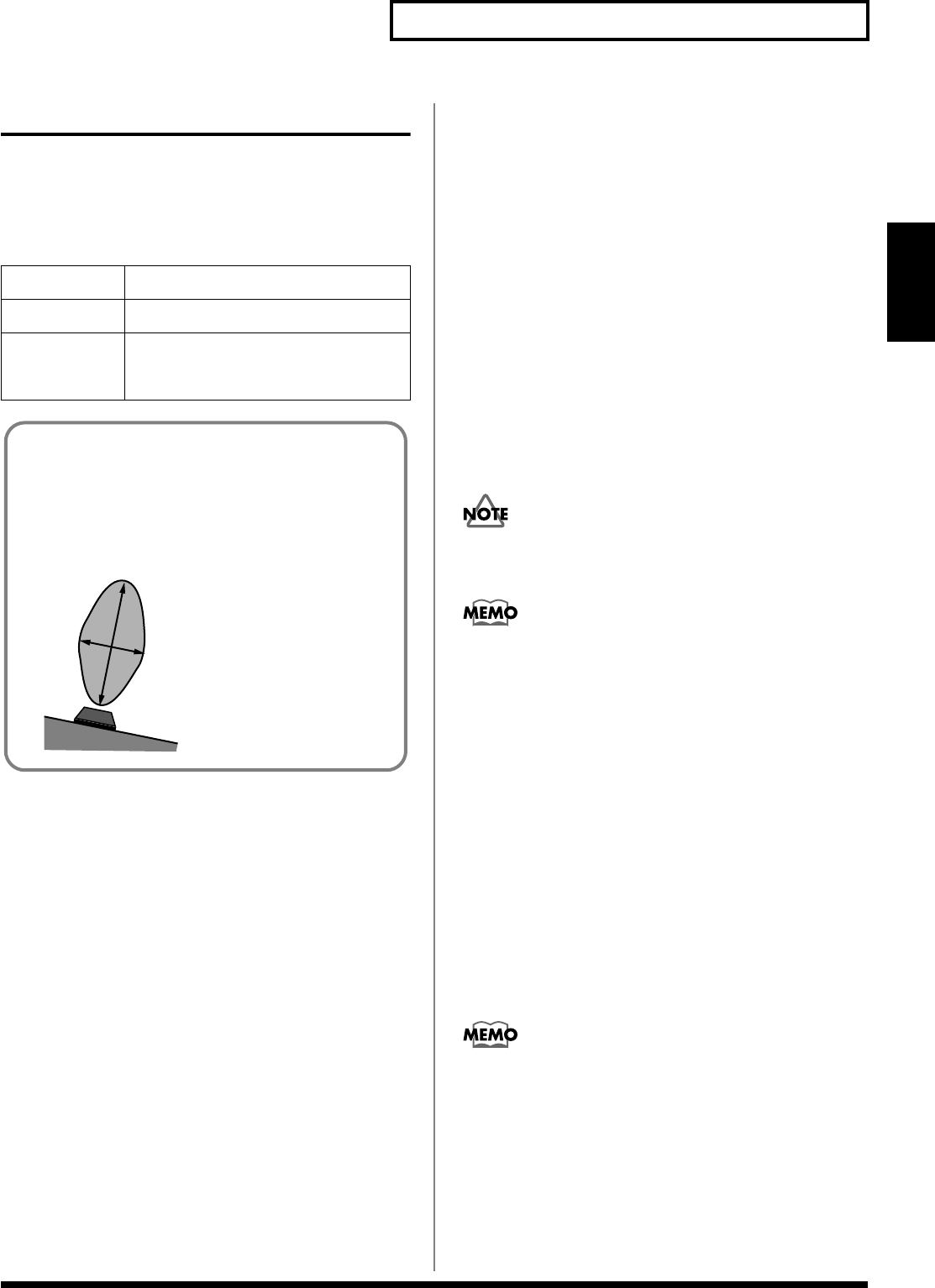
35
Playing a pattern
Pattern Mode
D Beam Controller
The D Beam controllers let you perform control operations simply by
passing your hand over the controller. Three different uses (such as
solo synth and turntable) for this controller are offered as presets,
but by editing the settings you can use these controllers to apply a
wide range of other effects.
SOLO SYNTH
This is a monophonic synthesizer for which your left hand (beam 1)
controls volume, and your right hand (beam 2) controls the pitch.
1.
Press [D BEAM ASSIGN] so the “SOLO SYNTH”
indicator is lighted.
2.
Press [BEAM 1 ON] and [BEAM 2 ON] so both
indicators are lighted.
3.
When you move your hand near beam 1, sound will
be heard.
• After the sound begins, moving your hand closer to beam 1 will
make the volume softer, and moving your hand away will make
the volume louder.
• Moving your hand closer to beam 2 will raise the pitch, and
moving your hand away will lower the pitch.
* If the hand that is near beam 1 leaves the effective range of the D Beam
controller, the volume will gradually diminish and finally the sound
will disappear. This prevents the sound from remaining “stuck on.”
* You can change the pitch range (p. 130).
CUT + RESO (Cutoff + Resonance)
Your left hand (beam 1) controls the cutoff frequency of the filter (p.
59), and your right hand (beam 2) controls the resonance.
1.
Press [D BEAM ASSIGN] so the “CUT+RESO”
indicator is lighted.
2.
Press [BEAM 1 ON] and [BEAM 2 ON] so both
indicators are lighted.
3.
In the FILTER block, press [TYPE] to select Filter
Type (p. 59).
4.
Pass your hands over beams 1/2 to control the sound
of the current part.
• Moving your hand closer to beam 1 will raise the cutoff
frequency, and moving your hand away will lower it.
• Moving your hand closer to beam 2 will increase the resonance,
and moving your hand away will decrease it.
If the Filter Type has been set to LPF2 or LPF3, the resonance setting
will have no effect, so moving your hand over beam 2 will not affect
the sound.
You can adjust the variable range of the parameters (p. 130).
TURNTABLE
Your left hand (beam 1) controls the tempo (BPM), and your right
hand (beam 2) controls the pitch.
1.
Press [D BEAM ASSIGN] so the “TURNTABLE”
indicator is lighted.
2.
Press [BEAM 1 ON] and [BEAM 2 ON] so both
indicators are lighted.
3.
Pass your hands over beams 1/2 to control the BPM
and pitch of all parts.
• Moving your hand closer to beam 1 will slow down the tempo.
• Moving your hand closer to beam 2 will lower the pitch.
* If your hand leaves the effective range of the D Beam controller, the
sound will return to the original BPM and pitch.
You can also set it so moving your hand closer to the D Beam
controller will increase the tempo and raise the pitch (p. 130).
ASSIGNABLE (Other applications)
Refer to the D Beam controller-related parameters (p. 130) in the
System settings.
[BEAM 1 ON] Turns the left D Beam controller (BEAM 1)
on/off.
[BEAM 2 ON] Turns the right D Beam controller (BEAM 2)
on/off.
[TWIN D BEAM
ASSIGN]
Selects the function of the D Beam controller.
Press to cycle through the available choic-
es, which are: SOLO SYNTH, CUT+RESO,
TURNTABLE, and ASSIGNABLE.
The effective range of the D Beam controller
The following diagram shows the effective range of the D Beam
controller. Movements of your hand that occur outside of this
range will not produce any effect.
* The effective range of the D Beam controller will be greatly
reduced when it is used in strong, direct sunlight. Please be
aware of this when using the D Beam controllers outdoors.
fig.DBeam
MC-909_Ref_e.book 35 ページ 2005年3月1日 火曜日 午後3時29分


















